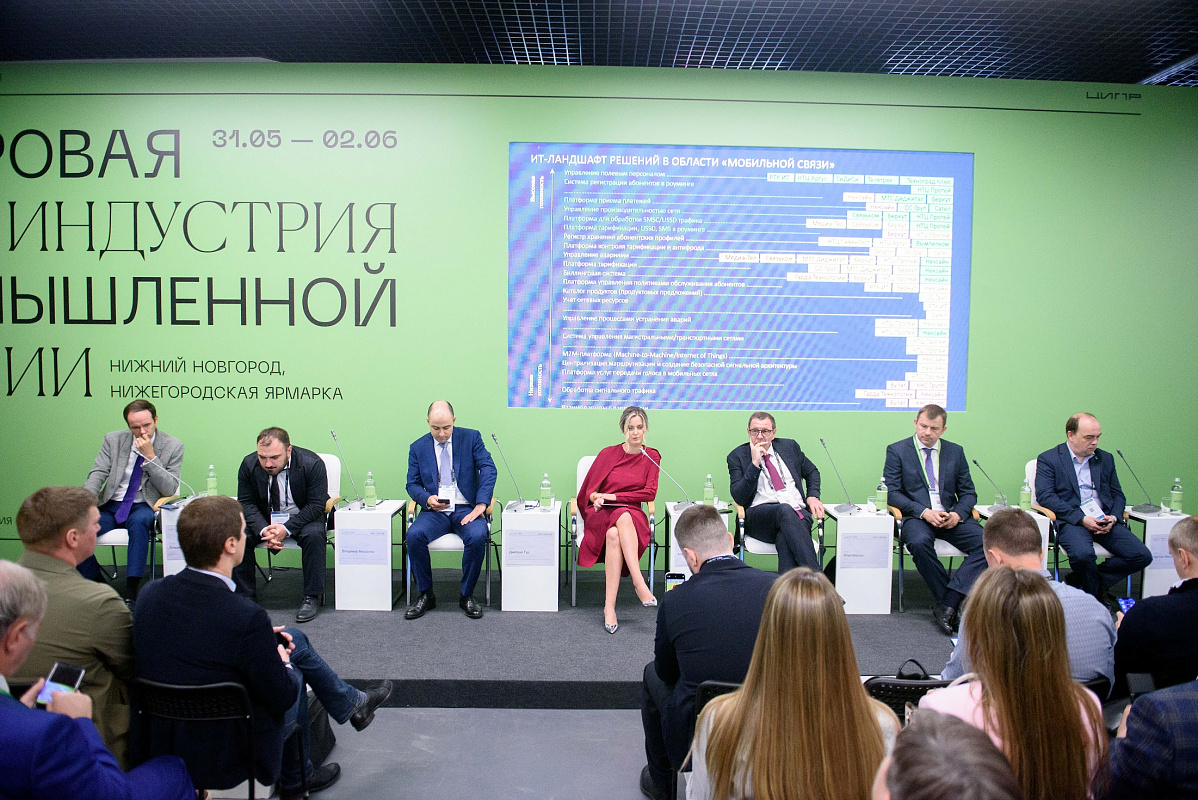
On May 31, the Digital Industry of Industrial Russia Multisectoral Exhibition (CIPR) hosted the plenary session Communication and Network — a New Map of Domestic Telecommunication Services. Representatives from the leading telecom operators, members of the Mobile Communications Industrial Competence Center, and software developers offered their perspectives and experiences in developing and deploying domestic software solutions for the telecom sector. Andrey Bogdanov, Bercut’s CEO, spoke on the company’s behalf at the plenary session.
The meeting was attended by Dmitry Tur, Director of the Department of State Regulation for the Telecommunications Market from the Ministry of Digital Development, Communications and Mass Media of the Russian Federation; Ilya Massukh, General Director of the ICT Import Substitution Competence Center; and representatives for major digital players, including Rostelecom, VimpelCom, MegaFon, and the key Russian software suppliers for telecoms services. The participants discussed the dependence of the industry on European and American software products, as well as hardware and software systems. Top executives of CSP companies developed a target image of the most critical solutions required by the industry and showed a heat map of the maturity of domestic software necessary for the successful operation of telecommunications businesses. They also discussed what they believed should make up a contemporary Russian operator’s IT environment in terms of import substitution.

Each of the guests emphasized the critical necessity to provide continuous service and subscribers’ access to cutting-edge and high-quality communication services, regardless of external conditions. Andrey Bogdanov, Bercut CEO, emphasizes in his speech that telecom operators have long been transforming into technology companies, and that a personalized approach to each individual group of subscribers, as well as the creation of unique and popular services, positions them ahead of other countries in the world.
“The telecom industry is extremely advanced in Russia. We provide unique offers to subscribers. Telecom operators are currently in need of software solutions that enable them to offer digital services in addition to communication services. This establishes a specific direction for Bercut’s product strategy because these products are directly related to the IT sphere in addition to the telecom sector. Apart from our own IT and telecom frameworks (IN Platform, HIP Bercut, UNICA platform), we are now creating solutions like HLR/HSS, DRA, SCP, and PCRF, which help diversify CSPs’ offerings. Besides, we follow the principles of import substitution.”
Andrey assured his colleagues that Bercut, as an IT provider, is ready to offer its partners the products that will allow them to minimize reliance on European and American suppliers while simultaneously continuing the secure development of the telecoms industry.
“We can proudly state that since the departure of foreign vendors, Tele2 has not reported a single critical fault in software infrastructure. Regardless of external circumstances, digital products and services continue to evolve. As a major technology partner, we have demonstrated that it is feasible to sustain high development dynamics and trouble-free operation with a trustworthy Russian IT partner.”
Many of the session speakers compared maintaining the stable operation of an IT landscape to fixing a car. They expressed concern that, as foreign vendors leave, telecom operators will have to delve deeply into the engineering details of the “automobile”, which means they will need to examine every product and solution in detail in order to make complex improvements. Bercut alleviated these fears by providing the market with a hybrid integration platform — HIP Bercut.
“Bercut aims for global cooperation. The platform we use to create our products encapsulates all the necessary technological features, such as microservices and Kubernetes, as well as a comprehensive and advanced developer toolkit. Go ahead and use your imagination! As an IT supplier, our goal is to enable organizations to travel from point A to point B without having to think about the mechanics.”
No debate of digital sovereignty is complete without addressing information security. According to Ilya Massukh, General Director of the ICT Import Substitution Competence Center, telecom operators should prioritize information security systems as their key cross-industry solutions. Keeping with this theme, Andrey Bogdanov talked about Bercut’s secure approach to IT product development, which places information security on par with the essential features and specifications of the product.
“We have to make sure that our products are safe and trouble-free, especially the ones we sell to the Russian market.”
Telecom operators are working to restore IT competences as in-house processes. This leads to a reduction in interaction chains and the usage of the DevOps methodology, which accelerates the process of adapting new solutions. However, a shortage of competent workers in the market may limit the rate of these developments. Platform products that integrate development tools at many levels are hence becoming the most popular and pertinent solutions available today.
“We are aware of the challenge of obtaining qualified IT professionals. Therefore, as part of our technology strategy, we use a platform approach that allows teams of different skill levels to collaborate on the product. For developers, we offer tools and frameworks that enable them to code in the traditional manner. For those companies that lack such talents, we provide no-code and low-code solutions. This approach enables a more effective use of the company’s resources while speeding up the development of the products the operator offers to its subscribers,” comments Andrey Bogdanov.
The CIPR Exhibition regularly becomes a meeting place for market leaders where they exchange best practices, innovations, and ideas. As was the case in the previous year, this time the participants also arranged to gather outside the venue to further discuss their ideas. Market challenges have already brought together the session attendees, resulting in a clear understanding of software products that will be critical to the industry’s future growth and the extensive effort that operators and suppliers must make to guarantee the industry’s security and independence.

